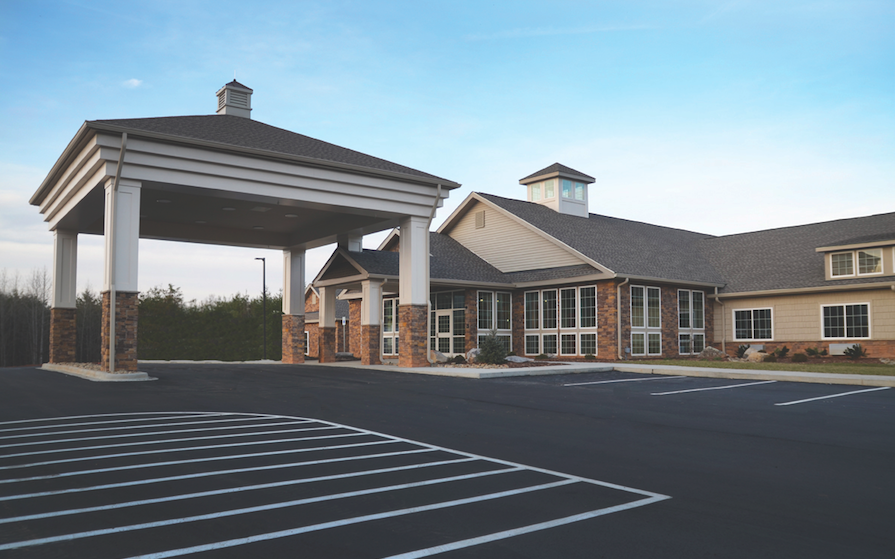Affinity Living Group is gaining scale and sophistication. The Hickory, North Carolina-based senior living provider plans to open or break ground on 16 properties this year and is developing a Medicare Advantage plan, although it has not ruled out partnering with an existing plan.
Affinity is slated to open six new assisted living communities this year and break ground on 10 more as it expands its footprint in the Southeast. Affinity is the largest provider in the region, and also one of the largest in the country with about 140 communities across six states.
The company’s long-term growth strategy is driven by its philosophy of providing affordable senior housing and care services for its residents, according to CEO Charles Trefzger.
“Our growth strategy is mission-based, and … to serve people who need that value-driven, cost-conscious solution to senior housing,” Trefzger told Senior Housing News. “I’m looking for those markets that can afford what we do and have the workforce committed toward helping me execute that mission.”
A regional power player
Already, the provider is nearing completion on properties in Morganton, Kannapolis, Smithfield and Nashville, North Carolina; as well as communities in Charleston, South Carolina and Montgomery, Alabama. Affinity is also searching for new properties to acquire, particularly turnaround properties. Many of those developments have between roughly 60 and 70 beds for residents, with the community in Charleston slated to have 157 units.
The company has a few different tools in its belt to finance that growth.
“We’re financing it a variety of ways, both conventionally with commercial banks and then also in the bond world as well,” Trefzger said. “We tend to use both the taxable and tax-exempt financing.”
To date, Affinity has focused on growing tall, not wide, by targeting just the Southeastern portion of the U.S. for new development and acquisitions. And it has no plans to change that any time soon.
“Regional companies are where our future lies, both as an industry and as a country,” Trefzger said. “It’s hard to be all things to everybody, everywhere. I’m focusing on the Southeast and being close to home.”
But that part of the country also carries some risks in the form of natural disasters. Last September, Hurricane Florence displaced about 550 Affinity residents in the Carolinas. The hurricane also threw a wrench in the provider’s growth plans, although it has recovered well in the time since, Trefzger said.
“It’s been a great distraction, and it certainly slowed down our new development a great deal,” he explained. “But we’ll get through it, and we’re almost there now.”
From MA plans to ‘apothecaries’
Fitting into the overall push to make its services more affordable, Affinity is currently looking into developing its own MA plan as some other senior living providers have done — but it wasn’t the provider’s first course of action, and the company still may partner with an existing plan.
“We’ve tried to link up with one, but the market is so dynamic and there’s so many changes that are occurring right now in the health plan space that every time we turn around, it seems like someone is buying somebody else and the opportunity that was once there is no longer there,” Trefzger said. “I would very much like to partner with a health plan … but I’m also developing a plan B for if I’m unable to find one.”
Specifically, the company is “in the throes of developing an MA plan,” he said, although it likely will be 2021 before this initiative comes to fruition.
Another way Affinity hopes to set itself apart from competitors is through its use of technology and innovative ideas. One part of that strategy lies in creating “apothecaries” inside of its senior living communities.
“We’re trying to get rid of our medical carts and turn them into stationary fixtures inside of a specialized room in our facilities,” Trefzger said. “The concept of the apothecary is to allow us to spend private one-on-one time with our care teams so they can ask questions that are difficult to do when you’re out in the middle of a hallway or in a resident room passing medication.”
To achieve this goal, Affinity has worked with its technology and medication management partners to create new efficiencies.
For example, Affinity just finished rolling out a system it customized with electronic health record company MatrixCare to capture some outcome results and data related to its residents, a process that was years in the making. And it’s currently working with medication management provider Omnicare to get its multidose packaging model and electronic medical record (EMR) systems fully integrated.
“We’ll have our MatrixCare system throughout all of our facilities along with our EMR system, and also tie it to our electronic health record system,” Trefzger said. “It will allow us to spend more time doing one-on-one caregiving because we’ll have more time with the resident and less time spent doing things that are more administrative.”
At the end of the day, it’s all about offering assisted living services at a lower price when possible, and the provider sees efficiencies of scale as key to that effort.
“We’re trying to scale our company to be extraordinarily efficient and create value for our customers,” Trefzger said. “By having systems and organization in place, I can scale the company to create those operating efficiencies.”


